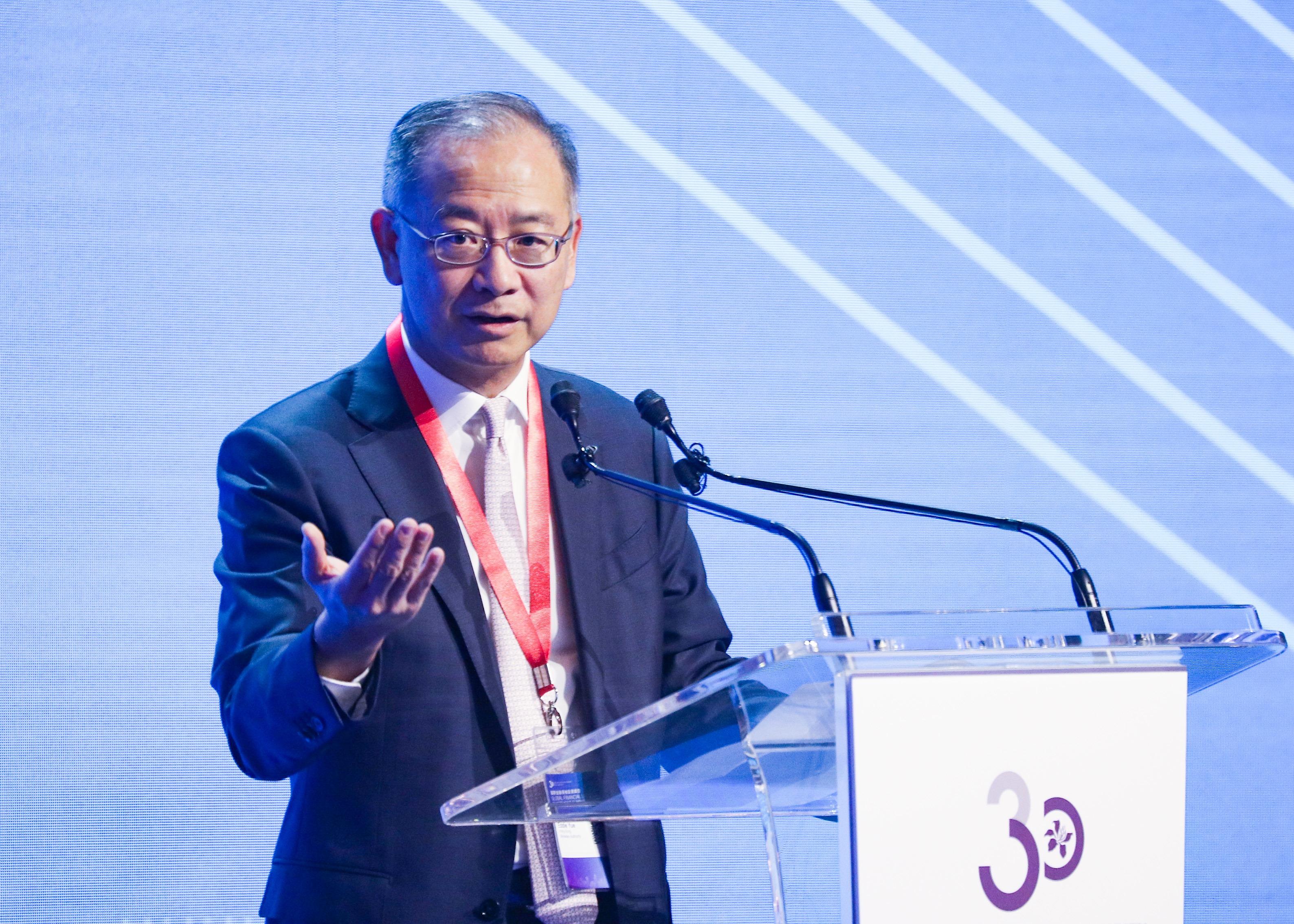 Eddie Yue Wai-man, Chief Executive of the Hong Kong Monetary Authority, delivers a speech during the Global Financial Leaders' Investment Summit 2023 at a hotel in Hong Kong on Nov 7, 2023. (CALVIN NG / CHINA DAILY)
Eddie Yue Wai-man, Chief Executive of the Hong Kong Monetary Authority, delivers a speech during the Global Financial Leaders' Investment Summit 2023 at a hotel in Hong Kong on Nov 7, 2023. (CALVIN NG / CHINA DAILY)
HONG KONG – The Hong Kong Monetary Authority announced that the Exchange Fund recorded an investment loss of HK$5.5 billion ($705 million) in the third quarter of this year, reversing the investment gain of HK$8.4 billion registered in the second quarter, as rises in global interest rates crimp the fund’s performance.
In the period, investment income from bonds was HK$15.7 billion, while Hong Kong equities, foreign equities and foreign exchange made investment losses of HK$5.7 billion, HK$8 billion and HK$7.5 billion, respectively.
In the third quarter, the Exchange Fund disbursed HK$4 billion to fiscal reserves, and another HK$4.2 billion to Hong Kong Special Administrative Region government funds and statutory bodies.
ALSO READ: Jobless rate in Hong Kong rises to 2.9%
In the first nine months of 2023, the Exchange Fund posted an investment income of HK$110.9 billion. Last year, the Exchange Fund incurred an investment loss of HK$205.4 billion.
During more difficult times, it is necessary to remain defensive and diversified in the management of the Exchange Fund portfolio, said Yue
The investment environment in the third quarter remains difficult, as global asset markets are roiled by market expectation of a prolonged period of high interest rates due to the US Federal Reserve’s hawkish monetary policy stance.
HKMA Chief Executive Eddie Yue said he is worried that the trend in interest rate movements is still uncertain.
“Whether the US Federal Reserve will raise interest rates again depends on the economic data in the United States and there is still uncertainty. As for political factors, they may also increase the uncertainty of the interest rate environment, especially the situation in the Middle East, which may cause energy prices and inflation to rise.”
Yue said he believes that, during more difficult times, it is necessary to remain defensive and diversified in the management of the Exchange Fund portfolio.
ALSO READ: Nearly half of HK's AI firms struggle to recruit tech talent
“For defensiveness, the HKMA invests in bonds with shorter maturities so that when interest rates rise, interest income will not be eroded much by the rise in the 10-year government bond yield. Regarding diversification, the HKMA invests in private equity funds, the real estate market, and other alternative assets, hoping to have better returns in the medium and long term,” Yue said in the Legislative Council Panel on Financial Affairs on Friday.
As a foreign exchange reserve, the Exchange Fund invests in a globally-diversified portfolio, whereas Hong Kong assets generally are not allocated for preventing conflicts of interest, and avoiding negative impacts on Hong Kong’s financial stability if the HKMA has to sell those assets, the HKMA chief reiterated.
The Hong Kong equities within the Exchange Fund portfolio are those shares traded on the Hong Kong Stock Exchange, which were snapped by the HKMA in 1998 when the city’s financial system was beleaguered by the Asian financial crisis.
ALSO READ: Leung: LegCo to promote HK development in next 25 years
Yue mentioned that as high interest rates in the US linger, some portion of capital has flowed out from Asian bond funds, leading to the depreciation of Asian currencies against the US dollar. He believes high interest rates may linger for a while as the US economy is still maintaining growth even after successive interest rate hikes.
“Overall, risks in Hong Kong’s financial system remain controllable. Total deposits of Hong Kong banks increased 2.3 percent in the first nine months (of 2023), and Hong Kong dollar deposits also increased 1.6 percent, indicating that there was no capital outflow in Hong Kong,” Yue said.


